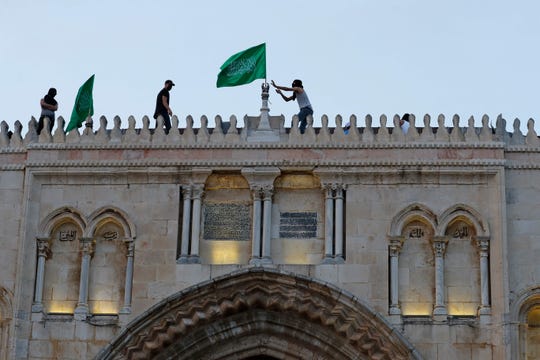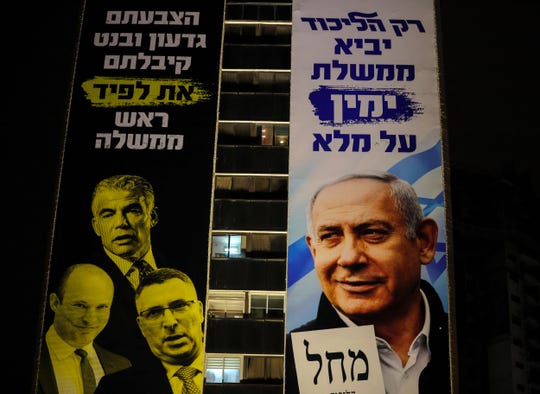Key players in the Israel-Palestinian conflict and why peace remains elusive in Gaza
WASHINGTON – President Joe Biden is under mounting pressure to help end the deadly conflict between Israel and Hamas, the militant group that controls the Gaza Strip. In a week of airstrikes and rocket attacks, at least 212 Palestinians and 10 Israelis have been killed.
But while the United States has significant leverage in the region and has long sought to broker a peace deal between Israel and the Palestinians, the White House is not the most important player right now.
Here’s a look at the roles and motivations of those engaged in the military confrontation – and those trying to end it.
Hamas

Palestinians place the Hamas movement flag atop al-Aqsa mosque in Jerusalem's Old City on May 10, 2021, ahead of a planned march to commemorate Israel's takeover of Jerusalem in the 1967 Six-Day War. (Photo: AHMAD GHARABLI, AFP via Getty Images)
Hamas is a militant Islamic group that does not recognize Israel’s right to exist. It was started in 1987 by a Palestinian cleric, and since 2007, Hamas has controlled Gaza, a small patch of land bordering the Mediterranean Sea and home to about 2 million Palestinians.
The United States and the European Union consider Hamas a terrorist organization. Hamas’ military tactics against Israel have shifted over the years from plotting suicide bombings to amassing an arsenal of rockets of varying accuracy.
The group has long been opposed to peace talks between Israel and the Palestine Liberation Organization, the umbrella political organization that runs the West Bank with the Fatah Movement. Hamas condemned the 1993 Oslo Accords, under which the Palestinians gained a measure of governing authority over parts of the West Bank and Gaza, while the PLO formally recognized Israel.
In the current conflict, Israel’s military says Hamas has fired more than 3,000 rockets at civilian targets in Israel. Israel Defense Forces say they have intercepted about 90% of those with its sophisticated Iron Dome missile defense system.
Israel's Iron Dome aerial defense system intercepts a rocket launched from the Gaza Strip, controlled by the Palestinian Hamas movement, above the southern Israeli city of Ashkelon, on May 11, 2021. (Photo: JACK GUEZ, AFP via Getty Images)
Hamas, which has a political wing as well as a military one, is trying to capitalize on the disarray in Palestinian politics and to “get a leg up on Fatah,” Michael Koplow of the Israel Policy Forum, wrote in a recent analysis. Fatah is a rival Palestinian political party operating in the West Bank and led by Palestinian President Mahmoud Abbas.
Israeli Prime Minister Benjamin Netanyahu
Israeli Prime Minister Benjamin Netanyahu is a hardline leader who has aggressively promoted Jewish settlements in the West Bank and other Palestinian enclaves.

Israeli Prime Minister Benjamin Netanyahu and his political rivals, Gideon Saar, Naftali Bennett and Yair Lapid pictured in Jerusalem on March 4, 2021. (Photo: AHMAD GHARABLI, AFP via Getty Images)
Critics say his policies helped set the stage for the current conflict by creating a sense of hopelessness among Palestinians who want their own independent state. One spark for the current military confrontation was an effort by Jewish settlers to evict Palestinian families from their homes in East Jerusalem.
Netanyahu, Israel’s longest-serving prime minister, has been unable to assemble a governing coalition after four successive elections in which the Israeli electorate declined to give his right-wing Likud party a clear majority. The Israeli leader has been scrambling to stay in power in part because he faces a corruption trial and has been seeking immunity from Israel’s parliament.
Source: Read Full Article

